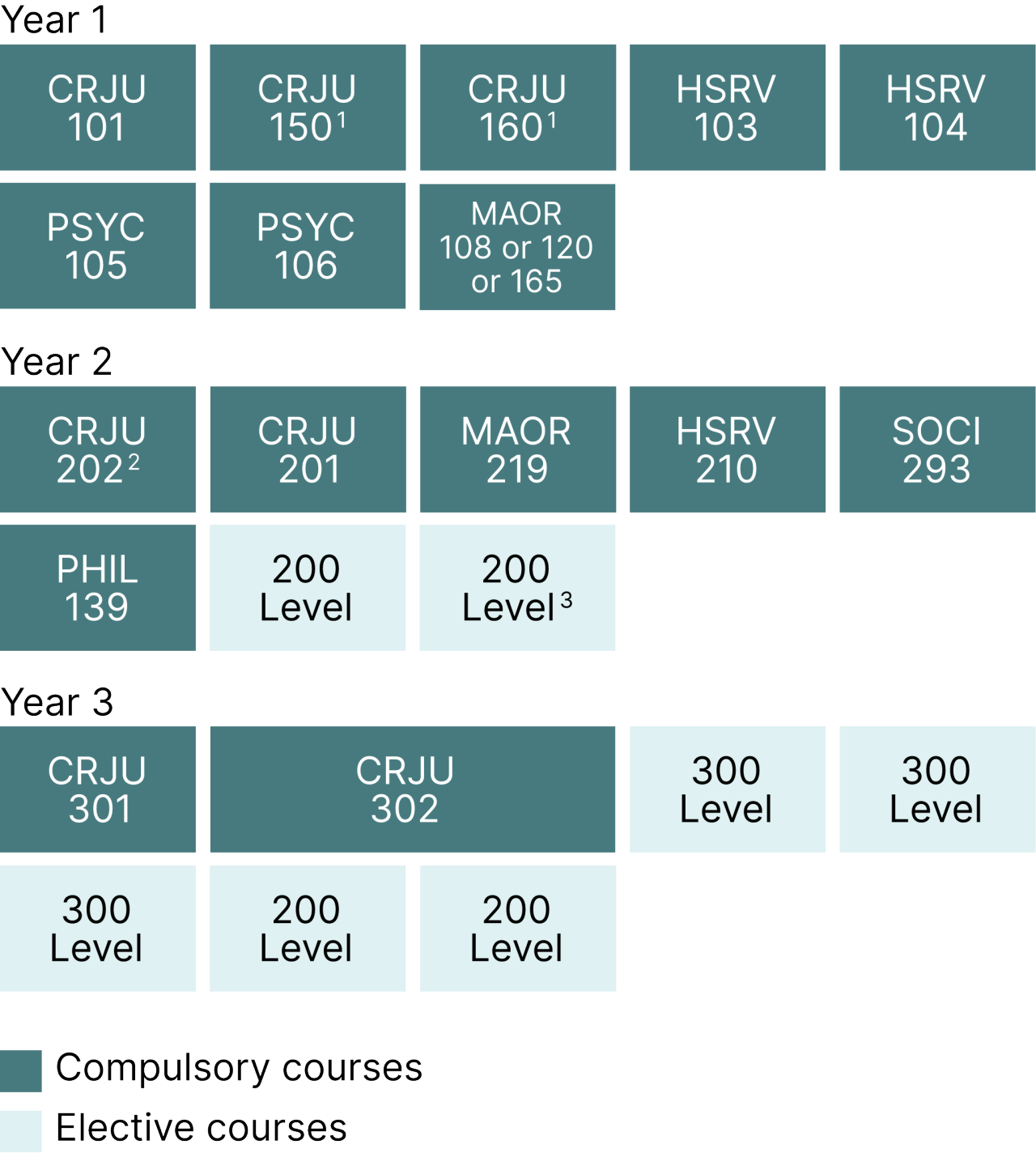Bachelor of Criminal Justice
- Degree Structure - Start In
- Semester 1 or 2 (February or July)

Our Bachelor of Criminal Justice (BCJ) is the first degree of its kind in Aotearoa. It combines multidisciplinary academic study with a strong vocational focus. Find out about studying a BCJ through UC's Te Kaupeka Toi Tangata | Faculty of Law.
360
The BCJ is the first degree of its kind in Aotearoa, combining multidisciplinary academic study with a strong vocational focus.
Criminal Justice studies take a 360-degree look at the criminal justice system and its processes, including governance, enforcement, rehabilitation, and improvement. The degree draws together UC’s expertise in criminology, sociology, developmental and behavioural psychology, policing, criminal law and procedure, and human services.
Admission to UC with University Entrance (or equivalent) is required to enrol.
If English is your additional language, you are also required to meet UC's English language requirements.
See Admission and enrolment for all information on enrolling at UC.
The BCJ does not require a background in any specific subject at secondary school and is open to anyone with entry to the University.
The Bachelor of Criminal Justice requires 360 points:
A minimum of 135 points must be from courses above 100-level, with at least 90 points at 300-level.
The degree takes 3 years of full-time study, or can be studied part-time for up to 10 years.
For the full degree requirements, see the Regulations for the Bachelor of Criminal Justice.
In the first year all courses are compulsory, to a total of 120 points (with another 15 points of 100-level compulsory courses usually taken in the second year).
In the second year you will take either 75 or 90 compulsory 200-level points. The difference in points depends on whether you take CRJU202 Criminal Law for Criminal Justice (15 points) or LAWS202 Criminal Law (30 points). The remaining 15 or 30 points at 200-level will be selected from the list of elective courses.
At third year there are 45 points of compulsory courses, with a choice of 60 points at 200 and 300-level from the list of elective courses. A final 15-point course at 200 or 300-level can also be completed from the list, or from courses in any other degree at UC.
It is possible to study a Bachelor of Criminal Justice alongside other degrees at the same time, such as the Bachelor of Laws or Bachelor of Science.
Find out more information about Double degrees.
The BCJ is a multidisciplinary degree that includes study across different subject areas and options to select topics of interest, including criminal behaviour, rehabilitation, human ethics, and many more.
Year 1
If enrolled in the double degree BCJ and Bachelor of Laws, LAWS101 Legal System: Legal Method and Institutions is taken instead of CRJU150 and CRJU160.
Year 2
If enrolled in the double degree BCJ and Bachelor of Laws, LAW202 Criminal Law is taken instead of CRJU202.
Year 3
Complete 105 points from this list of elective courses (or 90 if enrolled in a double degree BCJ and Bachelor of Laws). At least 45 points must be at 300-level.
One 15-point course at 200-level or 300-level can be chosen from courses from any other UC degree.
These courses are completed during the second and third years of study.
2024 tuition fee estimate: $7,043 per 120 points
2025 tuition fee estimate: $7,466 per 120 points
2024 tuition fee estimate: $35,100 per 120 points
2025 tuition fee estimate: $36,470 per 120 points
2026 tuition fee estimate: $37,890 per 120 points
Find out more about what can you do with a degree from UC.

(1) Students enrolling in the LLB/BCJ double degree will enrol in LAWS101 instead of CRJU150 and CRJU160.
(2) Students enrolling in the LLB/BCJ double degree will enrol in LAWS202 instead of CRJU202.
(3) If LAWS202 taken, then 45 points from the 200-level electives. If CRJU202 taken, then 60 points from the 200-level electives.
Each small block represents a 15-point course. However, some courses may be 30 points or more.
This diagram is an example only – other combinations are possible. For specific course requirements, see the Regulations for the Bachelor of Criminal Justice.